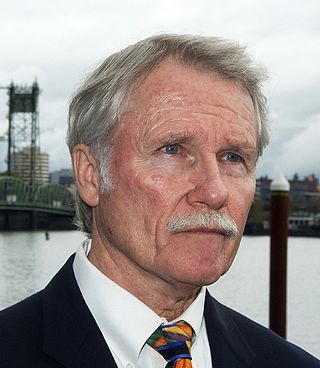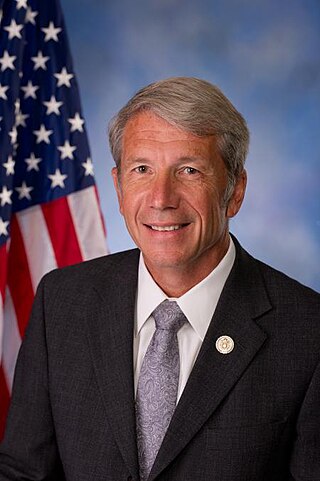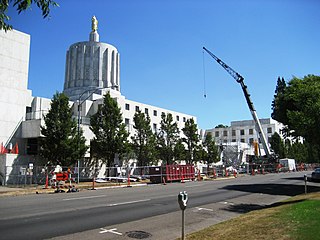A minimum wage is the lowest remuneration that employers can legally pay their employees—the price floor below which employees may not sell their labor. Most countries had introduced minimum wage legislation by the end of the 20th century. Because minimum wages increase the cost of labor, companies often try to avoid minimum wage laws by using gig workers, by moving labor to locations with lower or nonexistent minimum wages, or by automating job functions. Minimum wage policies can vary significantly between countries or even within a country, with different regions, sectors, or age groups having their own minimum wage rates. These variations are often influenced by factors such as the cost of living, regional economic conditions, and industry-specific factors.

Salem is the capital city of the U.S. state of Oregon, and the county seat of Marion County. It is located in the center of the Willamette Valley alongside the Willamette River, which runs north through the city. The river forms the boundary between Marion and Polk counties, and the city neighborhood of West Salem is in Polk County. Salem was founded in 1842, became the capital of the Oregon Territory in 1851, and was incorporated in 1857.

Theodore Ralph Kulongoski is an American politician, judge, and lawyer who served as the 36th Governor of Oregon from 2003 to 2011. A member of the Democratic Party, he served in both houses of the Oregon Legislative Assembly and also served as the state Insurance Commissioner. He was the Attorney General of Oregon from 1993 to 1997 and a justice of the Oregon Supreme Court from 1997 to 2001. Kulongoski has served in all three branches of the Oregon state government.

John Albert Kitzhaber is an American former politician and physician who served as governor of Oregon from 1995 to 2003 and again from 2011 to 2015. In February 2015, shortly after beginning his fourth term, Kitzhaber resigned from office and was replaced by Secretary of State Kate Brown. A member of the Democratic Party, Kitzhaber was the longest-serving governor in the state's history.
The Oregon tax revolt is a political movement in Oregon which advocates for lower taxes. This movement is part of a larger anti-tax movement in the western United States which began with the enactment of Proposition 13 in California. The tax revolt, carried out in large part by a series of citizens' initiatives and referendums, has reshaped the debate about taxes and public services in Oregon.

The Oregon Bottle Bill is a container-deposit legislation enacted in the U.S. state of Oregon in 1971 that went into effect in October 1972. It was the first such legislation in the United States. It was amended in 2007 and 2011. It requires applicable beverages in applicable sizes in glass, plastic or metal cans or bottles sold in Oregon to be returnable with a minimum refund value. The refund value was initially 5 cents until April 1, 2017, when it increased to 10 cents. The Oregon Legislature has given the Oregon Liquor Control Commission the authority to administer and enforce the Bottle Bill. Oregon Beverage Recycling Cooperative (OBRC), a private cooperative owned by retailers and beverage distributors, administers the collection and transportation of returned containers and keeps all the unclaimed deposits. Materials from returned containers are sold by the OBRC and proceeds are handed out to beverage distributors. In 2022, the bottle bill was expanded to include canned wine, which will become eligible for redemption on July 1, 2025.

Kevin Leese Mannix is an American politician, business attorney, and former chairman of the Republican Party in the U.S. state of Oregon.

In the United States, the minimum wage is set by U.S. labor law and a range of state and local laws. The first federal minimum wage was instituted in the National Industrial Recovery Act of 1933, signed into law by President Franklin D. Roosevelt, but later found to be unconstitutional. In 1938, the Fair Labor Standards Act established it at 25¢ an hour. Its purchasing power peaked in 1968, at $1.60 In 2009, it was increased to $7.25 per hour, and has not been increased since.
The Oregon Health Plan is Oregon's state Medicaid program. It is overseen by the Oregon Health Authority.
The Oregon tax rebate, commonly referred to as the kicker, is a rebate calculated for both individual and corporate taxpayers in the U.S. state of Oregon when a revenue surplus exists. The Oregon Constitution mandates that the rebate be issued when the calculated revenue for a given biennium exceeds the forecast revenue by at least two percent. The law was first enacted by ballot measure in 1980, and was entered into the Oregon Constitution with the enactment of Ballot Measure 86 in 2000.

Walter Kurt Schrader is an American politician and veterinarian who served as the U.S. representative for Oregon's 5th congressional district from 2009 to 2023. His district covered most of Oregon's central coast, plus Salem, and many of Portland's southern suburbs, and a sliver of Portland itself. A member of the Democratic Party, Schrader served in both houses of the Oregon Legislative Assembly from 1997 to 2008.

Coffee Creek Correctional Facility is a women's prison and prisoner intake center in Wilsonville, Oregon, United States. Operated by the Oregon Department of Corrections, the 1,684-bed facility opened in 2001 at a 108-acre (0.44 km2) campus. The selection of the location for the prison was controversial and included legal challenges. The minimum and medium security facility operates several programs designed to teach skills to inmates. Coffee Creek is the only women's prison in Oregon.

The Seventy-fourth Oregon Legislative Assembly was the Oregon Legislative Assembly (OLA)'s period from 2007 to 2008. There was a regular session in 2007, and a shorter special session in 2008.

Elizabeth Katharine Johnson is an American aviator, entrepreneur, and politician who served in the Oregon House of Representatives from the 1st and 31st House districts from 2001 to 2005, and in the Oregon Senate from the 16th district from 2005 to 2021, as a member of the Democratic Party. Prior to her tenure in the state legislature she served on the Port of St. Helens board and worked in the Oregon Department of Transportation.
Ballot Measure 25 of 2002 increased Oregon's minimum wage from $6.50 to $6.90 per hour and required an annual increase to compensate for inflation in future years. Inflation is measured by the consumer price index. As of 2015, the minimum wage in Oregon is $9.25 an hour. The measure was approved in the November 5, 2002 general election with 645,016 votes in favor, 611,658 votes against.Itemized Measure Listings, Measure 25 page 17 The measure was placed on the ballot as a result of initiative petition.

The 75th Oregon Legislative Assembly convened beginning on January 12, 2009, for its biennial regular session. All of the 60 seats in the House of Representatives and half of the 30 seats in the State Senate were up for election in 2008; the general election for those seats took place on November 4.

The 2010 Oregon gubernatorial election was held on Tuesday, November 2, 2010 to elect the Governor of Oregon to a four-year term beginning on January 10, 2011. The incumbent governor, Democrat Ted Kulongoski, was ineligible to run due to term limits barring him from being elected to more than two consecutive terms.

The economy of the U.S. state of Oregon is made up of a number of sectors. During the 1990s and 2000s, Oregon has attempted to transition its economy from one based on natural resources to one based on a mix of manufacturing, services, and high technology.

General elections were held in Oregon on November 2, 2010. Primary elections took place on May 18, 2010.

Oregon is a state in the Pacific Northwest region of the United States. Oregon is a part of the Western United States, with the Columbia River delineating much of Oregon's northern boundary with Washington, while the Snake River delineates much of its eastern boundary with Idaho. The 42° north parallel delineates the southern boundary with California and Nevada. The western boundary is formed by the Pacific Ocean.














